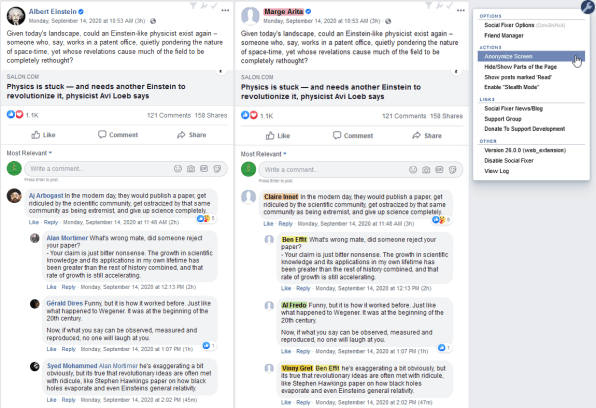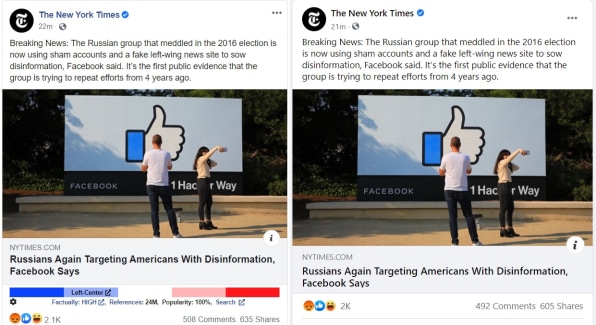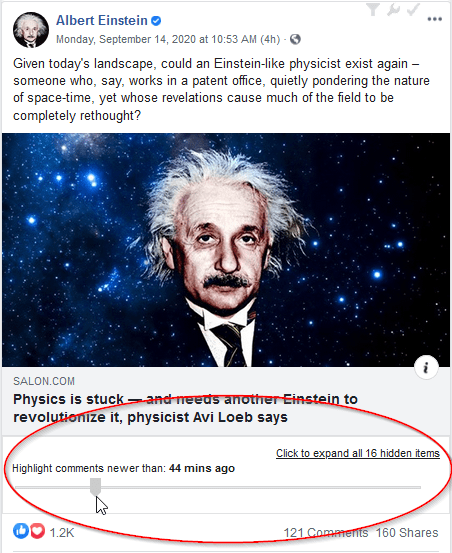A big change in Facebook’s code hurts extensions that customize or fact-check the News Feed.

In May of this year, Facebook started rolling out a major redesign for its website, with a more modern look, big navigation buttons on top, and a greater emphasis on Groups.
While the overhaul was overdue, it also turned several third-party browser extensions into collateral damage, including ones that help users evaluate the trustworthiness of news stories and customize their feeds. That’s because Facebook has fundamentally changed its website’s code in ways that make various parts of the site harder to identify. That’s left developers scrambling to make their extensions somewhat useful again, with no help from Facebook.
Extension makers say that while some work-arounds exist, getting things to work the way they used to may be impossible. And even if Facebook didn’t break their extensions on purpose, the change results in less control for users over how they experience the site, especially as the redesign becomes mandatory this month. Facebook did not respond to a request for comment.

“It may not be intentionally trying to take things away from users, but the point is, they don’t really care,” says Matt Kruse, the developer of the extension Social Fixer, which broke due to the redesign. “When they take away features, when they take away tweaks, when they take away the power of users to customize a tool to their liking, and force them into using it how they want them to, then they’re kind of being bullies.”

Obfuscated code
Richard Zack, CEO of the fact-checking service Our.News, says that under the old design, Facebook labeled the HTML code for each component of its website with plain-English descriptors. This allowed Our.News’s Newstrition extension for Chrome and Firefox to figure out where things would appear on the page and display fact-checks inside of News Feed posts.
With the new design, those plain-English descriptions are gone, and Facebook instead uses a jumble of random letters and numbers to identify the various parts of its website. Those random characters frequently change as well, so extension developers can’t easily determine what goes where.
“We were very surprised to see that actually Facebook has implemented a significant amount of what’s called code obfuscation,” Zack says. “What that does is make it extremely difficult to nearly impossible for any browser extension to work with their News Feed.”

Our.News isn’t the only media literacy extension that’s been affected by the new design. Media Bias/Fact Check, an organization that rates the political leanings and trustworthiness of news sources, also has stopped working with Facebook’s updated website. Previously, the extension had offered a bias scale that appeared inside Facebook posts linking to news articles, but it’s no longer visible in the new design. (The group, whose extension I discovered after looking into this issue, did not respond to multiple requests for comment.)
Extensions that try to customize Facebook’s News Feed have been affected as well. With Social Fixer, which lets users hide, manage, and filter different kinds of posts, Kruse has been able to restore only some of the extension’s functionality, mainly by looking for broad patterns within Facebook’s new code. Anything that relies on identifying individual posts—such as marking them as read, filtering by time, or hiding posts that originate from specific apps—doesn’t work anymore.
“Anything that manipulates the Facebook UI at all will break from this,” Kruse says.
FBPurity, another extension that modifies the News Feed by letting users hide and filter posts or force chronological order, has run into its own problems. A link to watch videos without ads no longer works, and the extension’s menu button sometimes disappears from Facebook’s navigation bar. When users of FBPurity try to load a conversation in Messenger, they sometimes don’t see any place to type. The extension can also fail to work properly with certain languages other than English, and previously hidden posts reappear after users have reloaded the page.
“Due to Facebook’s extensive changes to their website, some of FBP’s functionality does not yet work on the new Facebook design, and some of it may never work on it, as Facebook [has] tried to make it extremely difficult for extension developers to work their magic on the site,” FBPurity’s developer wrote in July.
Less bloat, broken extensions
As for why Facebook is hobbling these extensions, Zack of Our.News doesn’t think it’s an accident. He says code obfuscation is commonly done by websites that don’t want extensions affecting them, and believes Facebook may be doing it for security reasons. “They don’t want third parties to be able to know and understand how their website works,” he says.
There’s also a much more innocuous explanation: It’s all about optimizing code so that Facebook’s website loads faster. Facebook itself hinted at this explanation in a presentation last October, which described how the new design cuts down on duplicate code in the style sheets that determine how the page is formatted. If multiple parts of a page must be rendered in black, for instance, Facebook can generate a unique code for black that it uses in all the places that need it, rather than having to write out separate lines of code in each individual area.
“They’re trying to reduce their CSS, the code bloat that they’ve accumulated over the years,” Kruse says.

Given that Facebook has more than 2 billion users, Kruse doubts that the company would expend much energy on attacking browser extensions like Social Fixer, which has only a few hundred thousand users.
Still, it’s clear that the company isn’t interested in accommodating those extensions if its code starts causing problems. Kruse believes that if Facebook just added a handful of plain-English hooks to its code, he could restore more of Social Fixer’s features, but he’s not expecting that to happen.
“Facebook wants you to be a dumb user,” he says. “Don’t question it, don’t tweak it, don’t change it. Take it or leave it. I think that kind of attitude from tech companies is a negative for users.”
"feed" - Google News
September 15, 2020 at 07:00PM
https://ift.tt/2ZFaGtu
Facebook's big redesign is breaking News Feed extensions - Fast Company
"feed" - Google News
https://ift.tt/2z3xEQN
https://ift.tt/2yko4c8
Bagikan Berita Ini














0 Response to "Facebook's big redesign is breaking News Feed extensions - Fast Company"
Post a Comment